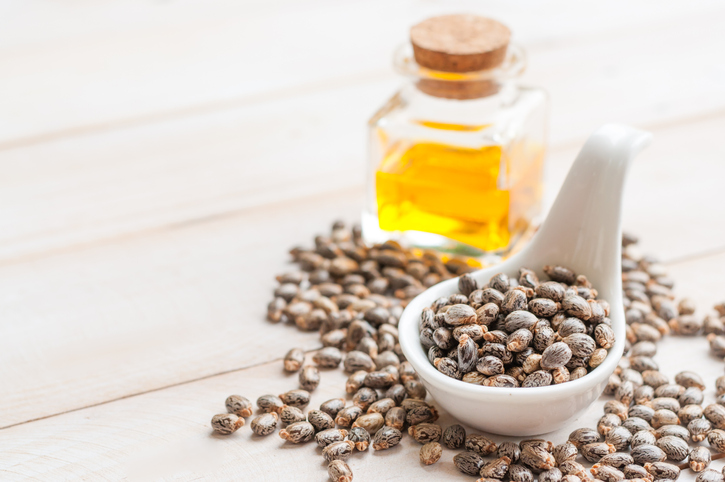
Some Really Cool Things About Castor Oil
By Joy Stephenson-Laws, J.D., Founder
I have a beauty tip. I put castor oil on my eyebrows and eyelashes to make them fuller. And actress Charlize Theron can relate.
“Someone told me about it. I put it [castor oil] on my brows and scalp once or twice a week. It’s definitely made my hair thicker,” she said, according to one report.
Cleopatra has even been said to use castor oil in her hair.

Castor oil is a type of vegetable oil made from castor beans (Ricinus communis). The “beans” are really just seeds. They are definitely not something you want to eat.
“Probably native to tropical Africa, the castor-oil plant has become naturalized throughout warm areas of the world. The plants are chiefly cultivated in India, China, and Brazil, largely as the source of castor oil. Although the plant is the only species in its genus, there are hundreds of natural forms and many horticultural varieties. The oil-rich seeds contain the poison ricin, one of the most toxic substances known, and consumption of chewed seeds can be lethal,” reports the Encyclopedia Britannica.
This does not mean that you should be afraid of castor oil.
Castor oil undergoes a heating process that deactivates the ricin.
So does castor oil make your hair grow?As with most topics in the health and beauty world, there is really not a “yes” or “no” answer. I have been having good results with my lashes and brows, but what may work for me may not work for you. You have to give it a try to see (while, of course, taking the necessary precautions).
The theory behind castor oil is that because it has anti-inflammatory, antifungal and antibacterial properties, it may help provide relief from scalp issues such as dandruff which can impede healthy hair growth. Castor oil is also a great moisturizer for the hair and scalp, and this is also important for healthy hair growth.
It is important, however, to make sure you are not allergic to castor oil. Test a small amount on your skin or talk to your dermatologist to see if castor oil is a good option for you.
Castor oil has other uses.
Reportedly, castor oil has been used for thousands of years.
“Castor oil may have a bad rap among people who were force-fed spoonfuls as children, but it's no myth that the tonic has health effects. Now, scientists have elucidated the molecular mechanism of the active ingredient in castor oil, which has been used for thousands of years as a laxative and labor-inducer. Ricinoleic acid, the fatty acid that makes up about 90% of the oil, binds to one particular receptor in the intestines and uterus, the researchers discovered,” according to one source.
Castor oil may also be used to empty bowels before a surgery. But before you use castor oil to treat constipation, it is good to speak with your doctor or a competent healthcare professional to see if this is a safe option for you. Castor oil may interact with certain medications. And if you are pregnant or breastfeeding, it is also important to first seek medical advice.
And, of course, if you are pregnant you should not take castor oil on your own to try to induce labor.
Castor oil may help with some of your skin woes.
For example, this oil may help treat acne. Due to its antiinflammatory and antibacterial properties, castor oil may help prevent and treat acne. If you have a breakout, test a small amount on a pimple and see if you notice an improvement. The oil is very thick, so a little goes a long way.
Castor oil may also treat dry skin and provide relief from pain due to sunburns.
Castor oil may be good for oral health.
Again, because castor oil may help combat inflammation and bad bacteria, it may help prevent the excessive growth of harmful bacteria in the mouth that can lead to gum disease.
Consider trying TheraBreath Oral Rinse which contains both castor oil and peppermint oil.
I’m going to continue to use castor oil for my eyebrows and eyelashes, because I continue to see good results. However, I want to make it clear that good nutrition is essential for healthy skin and hair as well as overall health.
Vitamins and minerals such as zinc, iron and vitamins C and D are important for hair growth and health.
For more information on nutrition and hair, check out this older pH Labs blog. If you are a Boomer woman, you especially might want to give this blog a read.
It is also important to take routine nutrient tests in order to identify any nutrient imbalances or deficiencies you may have. If the test reveals you have too much or too little of a certain nutrient, a competent healthcare professional can work with you on making the necessary dietary changes and recommend quality supplements if necessary.
Enjoy your healthy life!
The pH professional health care team includes recognized experts from a variety of health care and related disciplines, including physicians, attorneys, nutritionists, nurses and certified fitness instructors. This team also includes the members of the pH Medical Advisory Board, which constantly monitors all pH programs, products and services. To learn more about the pH Medical Advisory Board, click here.







